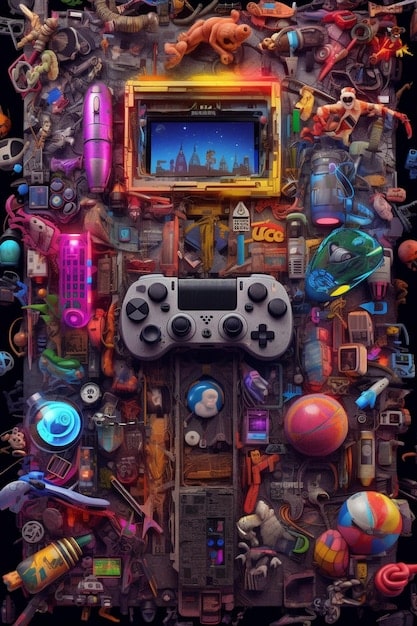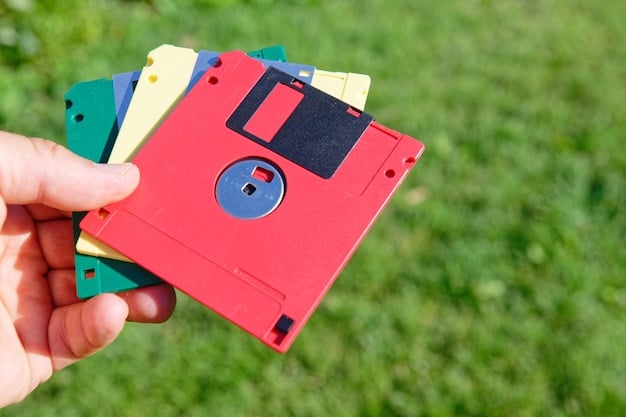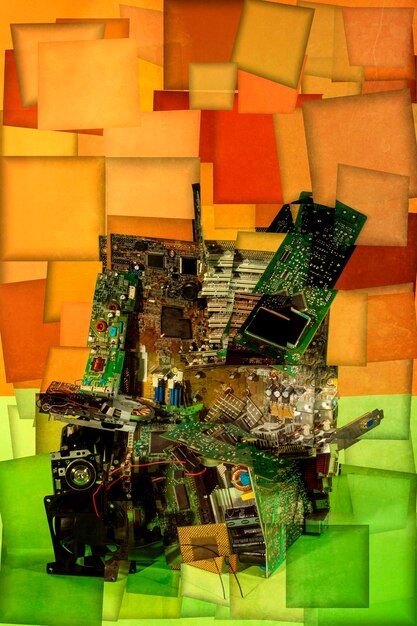Console Game Preservation: Ensuring Classic Games Remain Playable

Console game preservation involves methods to ensure that classic video games remain playable on future hardware and software, safeguarding gaming history and culture.
Ensuring classic video games remain accessible for future generations is a challenge. Console game preservation: how to ensure classic games remain playable for future generations involves a multi-faceted approach, from hardware emulation to legal and ethical considerations, all aimed at keeping the magic of retro gaming alive.
Why Console Game Preservation Matters
Console game preservation is important as it protects a significant part of our cultural heritage. Classic games offer insights into past technologies, design philosophies, and societal values, making their preservation crucial for future generations to understand and appreciate.
Moreover, many classic games are works of art, offering unique experiences that are no longer replicated in modern games. To ensure these experiences are not forgotten, active preservation efforts are required.
The Cultural Value of Classic Games
Classic games reflect the creative and technological advancements of their time. Preserving them allows us to study and appreciate the evolution of game design, storytelling, and technology.
The Economic Aspects of Game Preservation
The retro gaming market is substantial, with collectors and enthusiasts willing to pay significant amounts for vintage consoles and games. Preservation efforts can also lead to re-releases and remasters, offering economic benefits for developers and publishers.

Game preservation involves a range of techniques and strategies, some of which are described below:
- Emulation: Software that allows one system to mimic another.
- ROM Hacking: Modifying game ROMs to fix bugs or translate games.
- Hardware Preservation: Maintaining and restoring original consoles and peripherals.
Console game preservation ensures that the unique charm and historical relevance of classic games are not lost to time. This preserves not just the games, but also the memories and cultural context associated with them.
Understanding the Challenges in Console Game Preservation
Console game preservation encounters numerous obstacles that complicate efforts to maintain the playability of classic titles. These challenges range from technological limitations to legal and ethical considerations.
Moreover, the longevity of storage media and the obsolescence of hardware contribute to the difficulty in preserving console games, requiring innovative solutions and collaborative efforts.
Hardware Obsolescence
Older consoles break down and replacement parts become scarce, making it difficult to play original games on original hardware. Electronic components degrade over time, and without proper maintenance, consoles can become unusable.
Software and Format Incompatibility
Games are often tied to specific hardware and operating systems. As technology advances, older games may not run on newer systems without emulation or re-engineering. The rapid pace of technological change poses a significant threat to the long-term accessibility of classic console games.

Navigating these challenges requires a combination of technical expertise, legal understanding, and community support:
- Reverse Engineering: Analyzing hardware and software to understand how they work.
- Legal Frameworks: Developing legal exceptions for preservation purposes.
- Community Efforts: Volunteers and enthusiasts who contribute time and resources.
Console game preservation requires a concerted effort to overcome technological, legal, and practical barriers. Only through dedicated preservation strategies can we ensure these classic titles remain accessible for future generations.
Emulation: A Key Tool in Console Game Preservation
Emulation plays a crucial role in console game preservation by allowing modern devices to mimic the functionality of older gaming systems. This technology enables gamers to experience classic titles on contemporary hardware, circumventing the limitations.
Moreover, emulation enhances the accessibility of preserved games, making them easier to distribute and play on various platforms, from PCs and smartphones to modern consoles.
How Emulation Works
Emulation software simulates the hardware of a specific console, allowing the original game code to run on a different system. Emulators translate the instructions of the original hardware into instructions that the host system can understand.
Benefits and Challenges of Emulation
Emulation offers numerous advantages, including increased accessibility and improved graphics through upscaling and other enhancements. However, it also presents challenges, such as accuracy issues and legal concerns related to copyright.
Effective emulation depends on:
- Accuracy: Ensuring the emulated experience is faithful to the original game.
- Performance: Optimizing the emulator to run smoothly on modern hardware.
- Compatibility: Supporting a wide range of games and platforms.
Emulation is a powerful tool for console game preservation, offering a practical and accessible way to experience classic games on modern devices. Overcoming the challenges ensures authentic and enjoyable retro gaming experiences.
Hardware Preservation: Restoring and Maintaining Classic Consoles
Hardware preservation involves restoring and maintaining vintage gaming consoles to keep them in operational condition. This practice ensures that classic games can be experienced on their original platforms, preserving the authentic gaming experience.
To maintain gaming consoles and keep it in good shape, it requires specialized knowledge, skills, and resources, including sourcing replacement parts and repairing damaged components.
Sourcing Replacement Parts
Finding replacement parts for vintage consoles can be challenging due to their age and scarcity. Enthusiasts often rely on online marketplaces, salvage parts from non-functional consoles, or even create custom-made parts.
Techniques for Restoring Consoles
Restoring consoles involves cleaning, repairing, and sometimes replacing components. Common repairs include fixing faulty capacitors, replacing damaged connectors, and recalibrating the system for optimal performance. Skilled technicians and hobbyists are essential in this process.
Successful hardware preservation includes:
- Proper Storage: Storing consoles in a cool, dry environment to prevent damage.
- Regular Maintenance: Cleaning and inspecting consoles regularly to identify and address potential issues.
- Community Support: Participating in online communities to share knowledge and resources.
Hardware preservation safeguards the history of console gaming by ensuring that vintage consoles remain functional. These efforts allow future generations to experience classic games on their original hardware, preserving authenticity.
ROM Hacking and Fan Translations: Enhancing Game Accessibility
ROM hacking involves modifying game ROMs to fix bugs, improve gameplay, or translate games into different languages. Fan translations are especially important for making games accessible to a broader audience.
These community-driven efforts help extend the lifespan and accessibility of classic console games, addressing issues that may have been overlooked by the original developers or publishers.
The Role of ROM Hacking
ROM hackers create patches and modifications that can enhance the gaming experience. These modifications can range from simple bug fixes to complete game overhauls that introduce new features or content.
Creating Fan Translations
Fan translations make games accessible to players who do not speak the original language. This process involves translating the game’s text, graphics, and sometimes even audio, ensuring that the game can be enjoyed by a wider audience.
Effective fan translations depend on:
- Linguistic Accuracy: Ensuring the translated text accurately reflects the original meaning.
- Technical Skill: Modifying the game ROM to insert the translated content.
- Cultural Sensitivity: Adapting the game’s content to resonate with the target audience.
ROM hacking and fan translations play a vital role in console game preservation by improving the gaming experience and broadening the audience for classic titles. Community involvement ensures that these games remain accessible and enjoyable for years to come.
Legal and Ethical Considerations in Console Game Preservation
Console game preservation involves navigating complex legal and ethical issues, particularly related to copyright law. Understanding these considerations is crucial for preservation efforts to be legally sound and ethically responsible.
Moreover, balancing the rights of copyright holders with the public interest in preserving cultural heritage requires careful consideration and collaboration.
Understanding Copyright Law
Copyright law protects the rights of game developers and publishers, granting them exclusive control over their creations. Unauthorized copying, distribution, or modification of copyrighted games can result in legal action. Understanding the boundaries of copyright law is essential for responsible game preservation.
Fair Use and Preservation
Some legal frameworks, such as fair use in the United States, allow for the use of copyrighted material for purposes such as criticism, research, and education. Preservation efforts may fall under these exceptions, but the specific circumstances are crucial in determining legality.
Ethical game preservation requires:
- Transparency: Clearly communicating the purpose and scope of preservation efforts.
- Respect for Rights: Seeking permission from copyright holders when appropriate.
- Community Benefit: Ensuring that preservation efforts serve the public interest.
Addressing legal and ethical concerns is essential for ensuring that console game preservation efforts are sustainable and responsible. Respecting copyright law while advocating for preservation exceptions balances the rights of creators with the needs of future generations.
The Role of Communities and Organizations in Game Preservation
Communities and organizations play a crucial role in console game preservation by organizing events, knowledge exchange, and resource sharing among gamers, collectors, and historians.
These collaborative efforts help preserve gaming history, ensure the availability of classic titles, and promote awareness of the importance of game preservation, building connections and maintaining the cultural phenomenon that is the classic age of gaming.
Game Preservation Organizations
Organizations dedicated to game preservation work to archive, document, and restore classic games. These groups often collaborate with museums, libraries, and other institutions to ensure long-term access to gaming history.
Online Communities and Forums
Online communities and forums provide a platform for enthusiasts to share knowledge, resources, and enthusiasm for classic games. Members often contribute to preservation efforts by creating documentation, providing technical support, and organizing events.
Successful community involvement includes:
- Knowledge Sharing: Disseminating information about preservation techniques and best practices.
- Resource Pooling: Sharing equipment, software, and other resources to support preservation efforts.
- Advocacy: Raising awareness of the importance of game preservation and advocating for legal and policy changes.
Communities and organizations are vital to console game preservation, serving as hubs for collaboration, knowledge sharing, and advocacy. They ensure that classic games are not forgotten and provide ongoing support for preservation efforts.
| Key Point | Brief Description |
|---|---|
| 💾 Emulation | Using software to mimic console hardware, enabling games on modern devices. |
| 🛠️ Hardware Restoration | Repairing and maintaining classic consoles to keep them functional. |
| 🌐 Fan Translations | Translating games into multiple languages by community to make it more accessible. |
| ⚖️ Legal Considerations | Navigating copyright laws to ensure preservation efforts are legal and ethical. |
Frequently Asked Questions
▼
Console game preservation involves methods to ensure that classic video games remain playable on future hardware and software, safeguarding gaming heritage and culture.
▼
It protects cultural history, preserves unique artistic experiences, and allows future generations to understand the evolution of game design and technology.
▼
Challenges include hardware obsolescence, software incompatibility, legal and ethical issues related to copyright, and the degradation of storage media.
▼
Emulation allows modern devices to mimic the functionality of older gaming systems, making classic games accessible on new platforms, enhancing their accessibility and playability.
▼
Communities and organizations share knowledge, resources, and organize events, fostering awareness and support for preservation efforts among classic gaming enthusiasts.
Conclusion
Console game preservation is a critical mission to preserve the history of console games, ensuring their continued availability for future generations. Emulation, hardware restoration, ROM hacking, fan translations, legal understanding, and community collaboration are all vital to overcome preservation challenges.